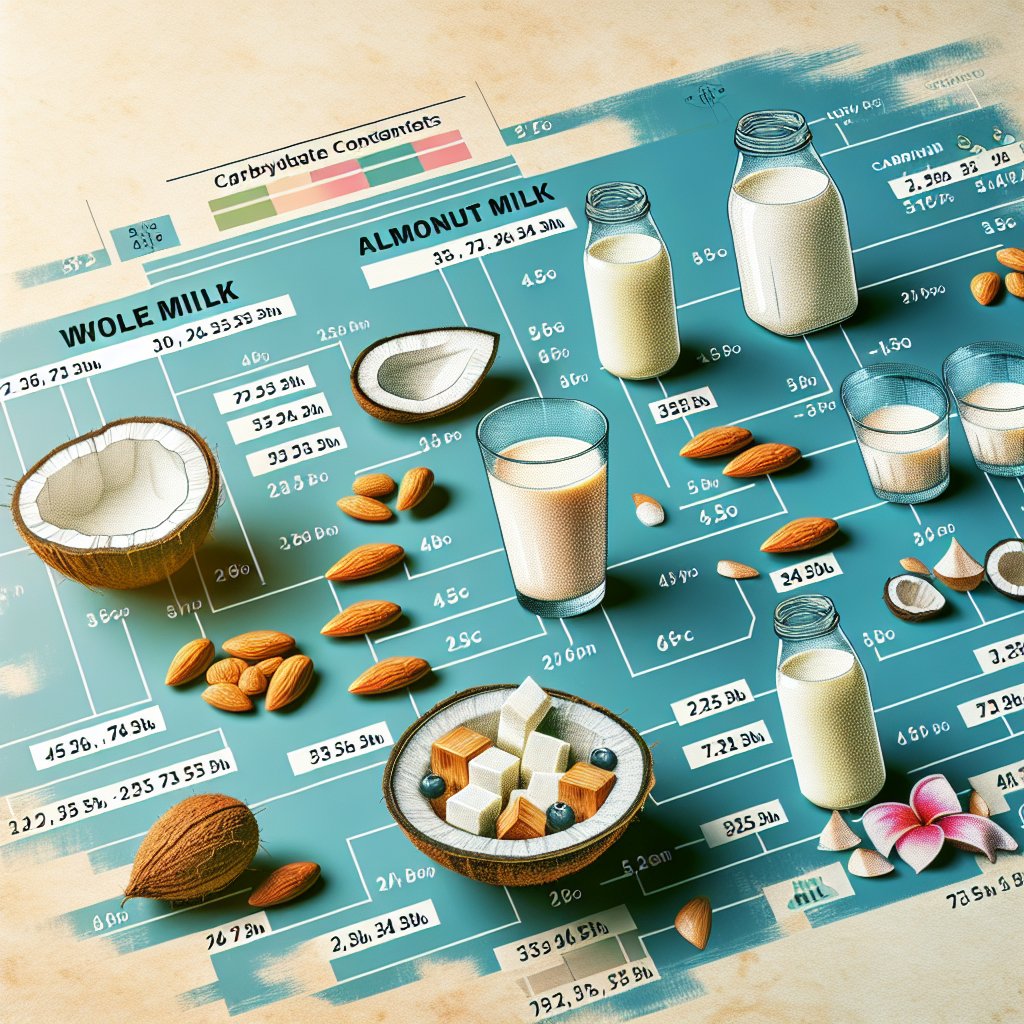Understanding the Keto Diet
Before we delve into the specific topic of whether milk is a good fit for the keto diet, let’s first understand the basics of the ketogenic eating plan. The keto diet is a low-carb, high-fat diet that offers various health benefits. It involves significantly reducing carbohydrate intake and replacing it with fat. This drastic reduction in carbs puts your body into a metabolic state called ketosis, where the body becomes incredibly efficient at burning fat for energy. Additionally, the diet emphasizes consuming moderate amounts of protein to support muscle maintenance and growth.
Crucial to the success of the keto diet is to understand which foods align with its principles. It’s important to focus on high-fat, moderate-protein, and low-carbohydrate intake. This means that foods like avocados, nuts and seeds, fatty fish, and healthy oils are excellent choices. On the other hand, foods high in carbohydrates, such as bread, pasta, and sugary snacks, should be significantly reduced or even eliminated from the diet.
Nutritional Profile of Milk
Before we dive into whether milk is good for a keto diet, let’s break down its nutritional content. Milk is a rich source of essential nutrients and is known for its macronutrient composition, including fat, protein, and carbohydrates.
When it comes to cow’s milk, a standard serving (1 cup) contains around 12 grams of carbohydrates, 8 grams of protein, and 8 grams of fat. These values can vary slightly depending on whether the milk is whole or skimmed.
Comparison of Different Types of Milk
Now, let’s compare different types of milk in terms of keto-friendliness. Whole milk is higher in fat but also contains more carbohydrates, making it less ideal for a ketogenic diet. On the other hand, skim milk has fewer carbs, but it is also lower in fat, which may not keep you full and satisfied for an extended period.
Almond and coconut milk are popular alternatives for those on a keto diet. Almond milk is low in carbs and calories and can be a good option for those who are lactose intolerant or prefer a dairy-free choice. Similarly, coconut milk is higher in healthy fats, making it a great choice for keto. Both almond and coconut milk are keto-friendly options that provide versatility in cooking and baking while keeping carbohydrate intake in check.
Detailed Exploration of Carbohydrate Content in Milk
When it comes to the ketogenic diet, a key factor to consider is the carbohydrate content in various types of milk. Understanding how different milk options fit into the keto lifestyle can make all the difference in maintaining ketosis and reaping the benefits of this eating plan.
Let’s start by breaking down the carbohydrate content in different types of milk. While cow’s milk is a common choice, it’s important to note that it contains a significant amount of lactose, a naturally occurring sugar. An 8-ounce serving of cow’s milk can contain around 12 grams of carbohydrates, which can impact ketosis if not carefully measured.
On the other hand, almond milk and coconut milk are popular alternatives for those following a keto diet. Unsweetened almond milk contains only 1-2 grams of carbohydrates per serving, making it a favorable choice for keto enthusiasts. Similarly, unsweetened coconut milk contains about 1-2 grams of carbohydrates per serving, making it another low-carb option for those aiming to maintain ketosis.
Impact of Carbohydrates on Ketosis
The presence of carbohydrates in milk, especially in cow’s milk, can impact ketosis. When carbohydrate intake is high, the body relies on glucose as its primary source of energy, which can inhibit the production of ketones. As a result, monitoring carb intake is crucial for those on a keto diet to maintain the metabolic state of ketosis, where the body burns fat for fuel.
It’s essential for individuals on a keto diet to be mindful of the carb content in milk and other dairy products to ensure that they stay within their daily carbohydrate limit, typically around 20-50 grams, while still enjoying the nutritional benefits of milk.

Analysis of the Fat Content in Milk and Its Role in the Keto Diet
When it comes to the ketogenic diet, the debate about whether milk is good or bad can be quite confusing. Let’s take a closer look at the fat content in milk and its role in the keto diet.
Whole milk is rich in fat, containing about 8 grams of fat per one-cup serving. The high-fat content in milk fits perfectly into the macronutrient profile of the keto diet, which emphasizes consuming low-carb, moderate-protein, and high-fat foods. The fat content in milk can provide a valuable source of energy for those following a ketogenic eating plan.
Moreover, consuming adequate fats is essential for achieving satiety on a ketogenic diet. Research published in the American Journal of Clinical Nutrition suggests that a higher intake of dietary fat can lead to increased feelings of fullness and reduced calorie intake, which may support weight management and overall well-being.
So, while milk does contain carbohydrates in the form of lactose, its fat content can still make it a suitable option for individuals following the keto diet, especially when incorporated mindfully into their daily macronutrient intake.
Protein Content in Milk
When it comes to the ketogenic diet, the role of protein is absolutely vital. Let’s take a closer look at the protein content in milk and its significance in a keto diet.
Milk is a fantastic source of high-quality protein. In fact, one cup of whole milk contains around 8 grams of protein. This is great news for those following a ketogenic eating plan, as protein plays a crucial role in muscle maintenance, metabolism, and overall health. Research published in the American Journal of Clinical Nutrition reveals that adequate protein intake can aid in weight management, improve muscle mass and strength, and support overall health.
When it comes to the keto diet, maintaining muscle mass is essential, and protein in milk can definitely help with that. Additionally, the high thermic effect of protein means that the body burns more calories during digestion, which may potentially aid in weight loss and metabolic health.
So, when asking the question, “Is milk good for the keto diet?” the protein content in milk speaks for itself. It provides the essential building blocks for muscle maintenance and repair, aids in metabolic function, and supports overall health and well-being while following a low-carb eating plan.

Calcium and Other Nutrients in Milk
When it comes to the ketogenic diet, it’s essential to pay attention to the micronutrient profile of the foods we consume. Milk, particularly whole milk, is a rich source of various nutrients, making it a topic of interest in the keto community.
Milk is well-known for its high calcium content. Calcium plays a crucial role in maintaining bone health and muscle function. It also helps in nerve transmission and hormone secretion. A single cup of whole milk provides about 276–352 milligrams of calcium, which is approximately 28–35% of the daily recommended intake for adults.
Aside from calcium, milk is also a good source of other essential nutrients such as vitamin D, vitamin A, and B vitamins. Vitamin D is important for calcium absorption and immune function, while vitamin A is vital for vision and immune health. The B vitamins, including B12 and riboflavin, contribute to energy production and red blood cell formation.
When following a specialized diet like keto, it’s crucial to maintain adequate nutrient intake. Many keto-friendly foods, while low in carbohydrates, may not always provide a wide range of essential nutrients. This is where milk can play a beneficial role. By incorporating milk into the keto diet in moderation, you can ensure that you are not only meeting your protein and fat needs but also fulfilling your body’s micronutrient requirements.
The Importance of Micronutrient Intake on Keto
While the keto diet offers various health benefits, including weight loss and improved blood sugar control, it can sometimes lead to micronutrient deficiencies if not carefully planned. It’s essential to focus on nutrient-dense foods like milk to prevent any deficiencies and support overall well-being while following a ketogenic eating plan.
Is Milk Good for Keto Diet? Exploring How Milk’s Nutritional Profile Fits into a Ketogenic Eating Plan
Benefits of Including Milk in a Keto Diet
When it comes to the keto diet, milk often gets a bad rap due to its natural sugar content. However, incorporating milk into a ketogenic meal plan can have several potential benefits that are worth considering. Let’s delve into the advantages of including milk in a keto diet:
Nutrient Density
Milk is a nutrient-dense food, providing essential nutrients such as calcium, vitamin D, and high-quality protein. These nutrients play a crucial role in supporting bone health, immune function, and muscle maintenance, which are all important aspects of overall well-being, especially when following a specific dietary regimen like keto.
Versatility in Recipes
One of the greatest advantages of milk is its versatility in various recipes. From creamy sauces to keto-friendly smoothies and desserts, milk can be used as a key ingredient to enhance both the flavor and nutritional value of a wide range of dishes. Its ability to create creamy textures and add richness makes it a valuable component in many keto recipes.
Role in Meeting Daily Macronutrient Goals
Milk can also play a role in helping individuals meet their daily macronutrient goals on a keto diet. With its balanced ratio of protein, fat, and carbohydrates, milk can be a convenient way to incorporate essential macros into one’s daily meal plan, thus contributing to a more balanced and sustainable ketogenic diet.
By understanding the nutrient density, versatility, and role in meeting daily macronutrient goals, it’s clear that milk can indeed be a part of a balanced ketogenic diet when consumed in moderation and in line with one’s specific dietary needs and goals.
For a complete keto-friendly experience, check out our delicious milk-based recipes that seamlessly fit into your ketogenic meal plan.
Incorporating milk into your keto diet might surprise you with its benefits!

Addressing Common Concerns about Consuming Milk on a Keto Diet
When it comes to the ketogenic diet, there are various considerations surrounding the consumption of milk. Let’s address some common concerns related to incorporating milk into a keto eating plan.
Lactose Intolerance and Milk on a Keto Diet
One of the primary concerns is lactose intolerance. Many individuals have difficulty digesting lactose, the natural sugar found in milk. However, it’s important to note that there are low-lactose and lactose-free milk options available, such as almond milk, coconut milk, and lactose-free cow’s milk. These alternatives can provide the creamy texture and flavor of milk without the potential digestive discomfort associated with lactose.
Possible Impact on Ketosis
Another consideration is the potential impact of milk consumption on ketosis. While milk contains naturally occurring sugars, including lactose, moderate consumption may still fit into a well-planned ketogenic diet. It’s important to factor in the carbohydrate content of milk when tracking daily macros to ensure it aligns with your individual keto goals. Additionally, selecting unsweetened or lightly sweetened milk options can help minimize the carbohydrate intake while still enjoying the nutritional benefits of milk.
Alternative Milk Options for Specific Dietary Needs
For individuals with specific dietary needs or preferences, there is a wide array of alternative milk options beyond traditional cow’s milk. Unsweetened almond milk, coconut milk, hemp milk, and macadamia nut milk are popular choices that can easily be incorporated into a ketogenic eating plan. These milk alternatives offer varying flavors and nutritional profiles, allowing individuals to select the option that best suits their dietary requirements.
When considering the role of milk in a keto diet, it’s essential to explore individual tolerance, macronutrient considerations, and the availability of alternative milk options to make informed choices that align with your health and wellness goals.
Is Milk Good for Keto Diet?
Summarization of Key Points on Milk Suitability for Keto
Alright, let’s summarize the key points we’ve covered about the suitability of milk for a keto diet. Milk can certainly be a part of a ketogenic eating plan, but it’s essential to be mindful of the carb content. Whole milk and flavored milk are higher in carbohydrates, so they might not be the best choice for those aiming to stay within their daily carb limits. However, unsweetened almond milk, coconut milk, or macadamia nut milk can be great low-carb alternatives. They offer the creamy texture and richness without the excessive carbs.
It’s important to encourage all of you to make informed choices based on your individual health goals and dietary preferences. If you love the taste of whole milk and it fits into your macros, there’s no reason to completely eliminate it. However, if you’re looking to minimize carbs and still enjoy milk, incorporating unsweetened plant-based options can be a fantastic solution.
As always, remember to focus on whole, nutrient-dense foods and consult with a healthcare professional or a registered dietitian to ensure you’re meeting your nutritional needs while following a keto lifestyle. It’s all about finding what works best for you and your body, and there’s no one-size-fits-all approach when it comes to nutrition.
In the end, the keto diet is about finding a sustainable way of eating that makes you feel good both physically and mentally. So, whether you choose to include milk in your keto journey or opt for alternative options, there are plenty of delicious and nutritious paths to reach your health and wellness goals.
So, cheers to making informed decisions and savoring every sip along the way!

